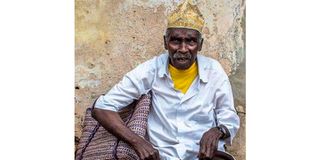Kiswahili poet, writer Haji Gora takes his final bow

Tanzanian poet, Haji Gora Haji, who died on June 11, 2021. Pool
What you need to know:
- The poet, who was also known as Mzee Kimbunga, was for a long time a fisherman, porter, sailor and transporter of cloves.
- Despite having grown up in poverty in Zanzibar, Mzee Haji Gora became one of the most prolific writers in Tanzania.
The Swahili literary fraternity is the poorer, following the demise of renowned poet and writer – Mzee Haji Gora Haji. Mzee Haji Gora Haji, arguably one of the most well known Swahili poets locally and internationally, died on Friday, June 11, at the age of 88.
The poet, who was also known as Mzee Kimbunga (The old Hurricane), a name he acquired from the title of his first poem of his anthology Kimbunga (Taasisi ya Uchunguzi wa Kiswahili, 1994), was for a long time a fisherman, porter in the Zanzibari harbour, sailor and transporter of cloves.
Just like other poets and writers, Mzee Haji Gora Haji drew the inspiration to compose his poetry from his immediate environment and daily experiences. According to his biographer, Ally Saleh, in his book, Maisha ya Haji Gora: Msanii Atayedumu Milele (Daima Publishing, 2016), Haji Gora Haji’s art remained largely unknown to the wider Swahili public until the publication of his brief anthology, Kimbunga, in 1994.
Describing the late poet as world artist in the true Swahili tradition, Ally Saleh writes: “He has worked in every genre of Swalili literature, from songs, stories and lengthy epics to three-line riddles, from folk tales handed down by oral tradition to a full-length novel.”
Haji Gora Haji was born was born in 1933 on Tumbatu island in the Zanzibari archipelago. He was the third child in a family of six. At the age of five, he moved to Zanzibar. He started schooling at the age of seven in a Koran School, due to abject poverty afflicting his family. His uncles were to later train him to be a fisherman.
Besides poetry, Mzee Haji Gora Haji wrote a novel, Siri ya Ging’ingi (The Secret of Ging’ingi, 2009) and some children’s books – Nahodha Chui (Captain Leopard, Oxford University Press, 2004), Kunganyira (E&D,2004), Ujanja wa Sungura (The Cunning Hare, Oxford University Press,2004) and Jogoo na Kanga (The cock and the guinea fowl, E&D, 2003).
Surviving prosodic poets
The late poet’s works also attracted literary critics and cultural enthusiasts from across the globe. There is a substantial amount of studies that have been written on his works.
He is also credited with compiling the Kamusi ya Kitumbatu (2006). In this dictionary, the writer collected and defined Kitumbatu lexicon. Kitumbatu is one of the 15 dialects that make up Kiswahili. The dictionary was published by Baraza la Kiswahili la Zanzibar (Zanzibar Swahili Council).
Mzee Haji Gora Haji was perhaps the last of the surviving prosodic poets of his generation. Other Swahili poets of his generation, ‘wanajadi’ (traditionalists), who were in the camp which insisted that Kiswahili poetry must stick to prosody include Mathias Eugen Mnyampala, Shabaan bin Robert, Kaluta Amri Abedi, Saadan Kandoro, Jumanne Mayoka (Tanzania), Mzee Sheikh Ahmad Nabhany, Hassan Mwalimu Mbega and Shibabuddin Chiraghdin, among others.
The ‘revolutionaries’ camp (wanamapinduzi) which ‘opposed’ this line of thinking in the 1970s had scholars such as Jared Angira, Euphrase Kezilahabi, Ebrahim Hussein, Crispin Haule and Mugyabuso Mulokozi, among others – who argued that poetry was more than sticking to the prescribed rules as encapsulated in Kaluta Amri Abedi’s book Sheria za Kutunga Mashairi na Diwani ya Amri (Kenya Literature Bureau, 1954).
The clash of ideas between the traditionalists and revolutionaries resulted into what came to be known as ‘mgogoro wa ushairi wa Kiswahili’ (the debate about Kiswahili poetry). In my paper – ‘Mgogoro wa Ushairi Baada ya Miaka Hamsini’ (Mwanga wa Lugha, Moi University Press, 2018), I observe that although the this debate later fizzled out, it created a canon and provided a prism through which Kiswahili poetry is viewed. The reverberations generated and or created by this debate keep popping up in literary criticisms done on Kiswahili poetry.
While paying tribute to the fallen writer, poet Khamis Mataka (Tanzania), who broke the news about the demise of Mzee Haji Gora Haji in a WhatsApp group of Chama cha Ukuzaji Kiswahihi Duniani (CHAUKIDU), wrote: “Maskini Kiswahili, Kutwa kucha ni huzuni/, Mauko yamkatili, asubuki na jioni/, Juzi lile leo hili, wana wenda kaburini/, Waswahili Makiwani, Katawafu Haji Gora."
The late poet was buried at his home in Tumbatu island on Saturday, June 12, 2021. Buriani Mzee Kimbunga.
Enock Matundura, the translator of Barbara Kimenye’s Moses Series (Oxford University Press) teaches Kiswahili Literature at Chuka University. [email protected]




